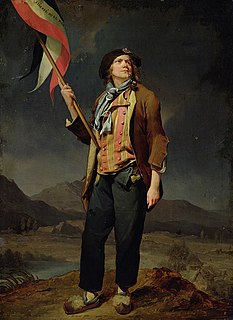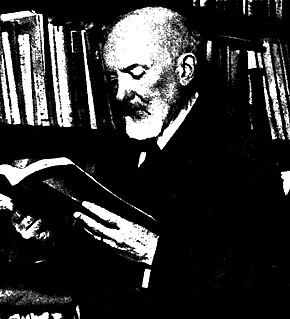Related Research Articles

The French Revolution was a period of radical political and societal change in France that began with the Estates General of 1789 and ended with the formation of the French Consulate in November 1799. Many of its ideas are considered fundamental principles of liberal democracy, while phrases like liberté, égalité, fraternité reappeared in other revolts, such as the 1917 Russian Revolution, and inspired campaigns for the abolition of slavery and universal suffrage. The values and institutions it created dominate French politics to this day.
A Jacobin was a member of the Jacobin Club, a revolutionary political movement that was the most famous political club during the French Revolution (1789–1799). The club got its name from meeting at the Dominican rue Saint-Honoré Monastery of the Jacobins. The Dominicans in France were called Jacobins because their first house in Paris was the Saint Jacques Monastery.

The Paris Commune was a revolutionary government that seized power in Paris, the capital of France, from 18 March to 28 May 1871.

The sans-culottes were the common people of the lower classes in late 18th-century France, a great many of whom became radical and militant partisans of the French Revolution in response to their poor quality of life under the Ancien Régime. The word sans-culotte, which is opposed to that of the aristocrat, seems to have been used for the first time on 28 February 1791 by Jean-Bernard Gauthier de Murnan in a derogatory sense, speaking about a "sans-culottes army". The word came into vogue during the demonstration of 20 June 1792.

The historiography of the French Revolution stretches back over two hundred years, as commentators and historians have sought to answer questions regarding the origins of the Revolution, and its meaning and effects. By the year 2000, many historians were saying that the field of the French Revolution was in intellectual disarray. The old model or paradigm focusing on class conflict has been challenged but no new explanatory model had gained widespread support. Nevertheless, there persists a very widespread agreement to the effect that the French Revolution was the watershed between the premodern and modern eras of Western history.
Cultural history combines the approaches of anthropology and history to examine popular cultural traditions and cultural interpretations of historical experience. It examines the records and narrative descriptions of past matter, encompassing the continuum of events about a culture.

Louis Charles Delescluze was a French revolutionary leader, journalist, and military commander of the Paris Commune.
Albert Marius Soboul was a historian of the French Revolutionary and Napoleonic periods. A professor at the Sorbonne, he was Chair of the History of the French Revolution and author of numerous influential works of history and historical interpretation. In his lifetime, he was internationally recognized as the foremost French authority on the Revolutionary era.

Henri Lefebvre was a French Marxist philosopher and sociologist, best known for pioneering the critique of everyday life, for introducing the concepts of the right to the city and the production of social space, and for his work on dialectical materialism, alienation, and criticism of Stalinism, existentialism, and structuralism. In his prolific career, Lefebvre wrote more than sixty books and three hundred articles. He founded or took part in the founding of several intellectual and academic journals such as Philosophies, La Revue Marxiste, Arguments, Socialisme ou Barbarie, Espaces et Sociétés.

Georges Lefebvre was a French historian, best known for his work on the French Revolution and peasant life. He is considered one of the pioneers of "history from below". He coined the phrase the "death certificate of the old order" to describe the Great Fear of 1789. Among his most significant works was the 1924 book Les Paysans du Nord pendant la Révolution française, which was the result of 20 years of research into the role of the peasantry during the revolutionary period.

Albert-Xavier-Émile Mathiez was a French historian, best known for his Marxist interpretation of the French Revolution. Mathiez emphasized class conflict. He argued that 1789 pitted the bourgeoisie against the aristocracy and then the Revolution pitted the bourgeoisie against the sans-culottes, who were a proletariat-in-the-making. Mathiez greatly influenced Georges Lefebvre and Albert Soboul in forming what came to be known as the orthodox Marxist interpretation of the Revolution. Mathiez admired Maximilien Robespierre, praised the Reign of Terror and did not extend complete sympathy to the struggle of the proletariat.
François Furet was a French historian and president of the Saint-Simon Foundation, best known for his books on the French Revolution. From 1985 to 1997, Furet was a professor of French history at the University of Chicago.

Louise Michel was a teacher and important figure in the Paris Commune. Following her penal transportation to New Caledonia she embraced anarchism. When returning to France she emerged as an important French anarchist and went on speaking tours across Europe. The journalist Brian Doherty has called her the "French grande dame of anarchy." Her use of a black flag at a demonstration in Paris in March 1883 was also the earliest known of what would become known as the anarchy black flag.
George Rudé was a British Marxist historian, specializing in the French Revolution and "history from below", especially the importance of crowds in history.

Marxism is a method of socioeconomic analysis that uses a materialist interpretation of historical development, better known as historical materialism, to understand class relations and social conflict as well as a dialectical perspective to view social transformation. It originates from the works of 19th-century German philosophers Karl Marx and Friedrich Engels. As Marxism has developed over time into various branches and schools of thought, currently no single, definitive Marxist theory exists.
Jonathan Charles Douglas Clark is a British historian of both British and American history. He received his undergraduate degree at Downing College, Cambridge. Having previously held posts at Peterhouse, Cambridge and All Souls College, Oxford into 1996, he has since held the Joyce C. and Elizabeth Ann Hall Distinguished Professorship of British History at the University of Kansas.

Marxism is a method of socioeconomic analysis that originates in the works of 19th century German philosophers Karl Marx and Friedrich Engels. Marxism analyzes and critiques the development of class society and especially of capitalism as well as the role of class struggles in systemic, economic, social and political change. It frames capitalism through a paradigm of exploitation and analyzes class relations and social conflict using a materialist interpretation of historical development - materialist in the sense that the politics and ideas of an epoch are determined by the way in which material production is carried on.

Marxist historiography, or historical materialist historiography, is an influential school of historiography. The chief tenets of Marxist historiography include the centrality of social class, social relations of production in class-divided societies that struggle against each other, and economic constraints in determining historical outcomes. Marxist historians follow the tenets of the development of class-divided societies, especially modern capitalist ones.

In Marxist philosophy, the dictatorship of the proletariat is a state of affairs in which the proletariat holds political power. The dictatorship of the proletariat is the intermediate stage between a capitalist economy and a communist economy, whereby the post-revolutionary state seizes the means of production, compels the implementation of direct elections on behalf of and within the confines of the ruling proletarian state party, and instituting elected delegates into representative workers' councils that nationalise ownership of the means of production from private to collective ownership. During this phase, the administrative organizational structure of the party is to be largely determined by the need for it to govern firmly and wield state power to prevent counterrevolution and to facilitate the transition to a lasting communist society. Other terms commonly used to describe the dictatorship of the proletariat include socialist state, proletarian state, democratic proletarian state, revolutionary dictatorship of the proletariat and democratic dictatorship of the proletariat.
The Situationist International's interpretation of the Paris Commune of 1871 was influenced by their collaboration with Henri Lefebvre with whom they had been in contact since the late 1950s. Lefebvre’s writings on revolutionary romanticism and everyday life were important influences on the early SI. In the early 1960s Guy Debord, Attila Kotányi and Raoul Vaneigem agreed to assist Lefebvre in his preparations for a book on the Commune. The results of their brainstorming sessions were written down in 1962 by the SI in their “Theses on the Paris Commune.” After Lefebvre published his respective notes on their collaboration, in a 1962 piece entitled “La Signification de la Commune,” the two parties had a falling out as the SI ostensibly disagreed with the journal in which he published. Both the SI and Lefebvre published extensively on the feud in the following decade.
References
- ↑ Johnson 1996, p. 7.
- ↑ Johnson 1996, p. 8.
- ↑ Johnson 1996, pp. 8–10.
- 1 2 Johnson 1996, p. 276.
- ↑ Johnson 1996, p. 277.
- ↑ Nicholls, Julia (2019). Revolutionary Thought after the Paris Commune, 1871-1885. Cambridge University Press. pp. 4–5. ISBN 978-1-108-49926-2.
- ↑ Taithe, Bertrand (1999). Defeated Flesh: Medicine, Welfare, and Warfare in the Making of Modern France. Rowman & Littlefield. p. 40. ISBN 978-0-7425-0049-5.
- ↑ Adcock, Michael; Chester, Emily; Whiteman, Jeremy, eds. (1997). Revolution, Society and the Politics of Memory: The Proceedings of the Tenth George Rudé Seminar on French History and Civilisation, Melbourne 1996. University of Melbourne, Department of History. p. 279. ISBN 978-0-7325-1260-6.